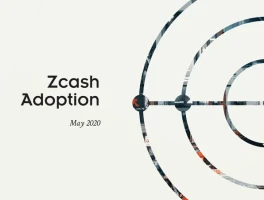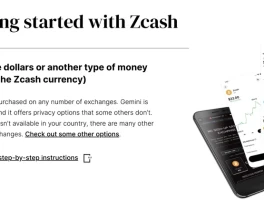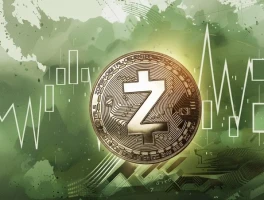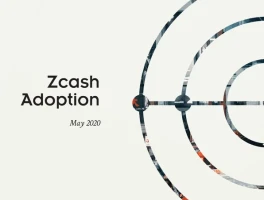I have to admit, I didn’t see this one coming. For years, Zcash felt like a ghost from a bygone era of crypto—a beautiful, cypherpunk dream from 2016, born from the same fire as Bitcoin but with a radical twist. It promised something we all instinctively crave: privacy. But in a world screaming for institutional adoption, AI tokens, and hyper-scalable Layer 2s, a quiet, privacy-focused coin felt… well, quaint. A relic.
Then, the fall of 2025 happened.
Out of nowhere, this forgotten asset didn’t just stir; it erupted. A 380% surge in a month, a market cap soaring to nearly $6 billion, and a name trending globally for the first time in years. The market-watchers pointed to technical breakouts, to Arthur Hayes’s wild price predictions, to a simple rotation of capital. But they were looking at the smoke and missing the fire. The real story, the one that truly matters for our digital future, wasn't happening on the price charts. It was happening in the shadows, by design.
When I first saw the chart tracking the shielded supply, specifically the jump in the new Orchard protocol, I honestly just sat back in my chair, speechless. It was a beautiful, silent rebellion written in code. This is the kind of breakthrough that reminds me why I got into this field in the first place.
The Silent Vote for Privacy
Let’s be clear: the Zcash surge wasn't just a speculative frenzy. It was a statement. While traders were gawking at the 7x price jump, the truly profound metric was the shielded supply hitting 4.5 million ZEC. Reports that the Zcash shielded supply hits 4.5 million ZEC as privacy narrative reignites and token surges 7x confirmed the trend. Now, what does that actually mean? Zcash has this incredible feature of optional privacy. You can send transactions on its public ledger, just like Bitcoin, or you can move your funds into a "shielded pool." This pool uses something called zero-knowledge proofs—in simpler terms, it's like proving you know a secret password without ever revealing the password itself. It allows the network to verify a transaction is valid without revealing the sender, receiver, or amount.
When more people move their ZEC into these shielded addresses, the "anonymity set" grows. Think of it like this: trying to find one person in an empty room is easy. Trying to find them in a packed concert stadium is nearly impossible. Every single person who chose to shield their funds made the entire stadium more private and secure for everyone else. This wasn't passive holding; it was an active, conscious choice. When you see millions of ZEC moving into these shielded pools, it’s not just numbers on a chart, it's a conscious, collective decision by thousands of people to reclaim their financial autonomy and that's a signal so powerful it cuts through all the market noise.
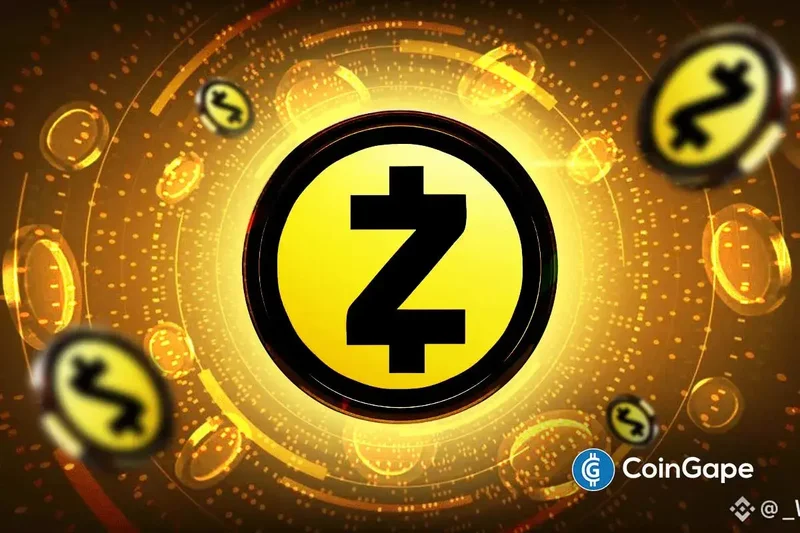
Why now? Why this sudden, desperate reach for a digital curtain? I don’t think it’s a mystery. We’re living through an era of unprecedented financial surveillance. With the rise of Digital IDs in the UK, new transaction tracing rules in the EU, and AI that can parse our financial lives with terrifying efficiency, we’ve begun to feel the walls of our glass houses closing in. The idea that every digital transaction we make should be an open book for corporations or governments to read is not freedom; it's a ledger of control.
What we witnessed with Zcash was a popular dissent. It was a market realizing that if cryptocurrency is to be the future of money, it cannot simply be a more efficient version of the old, transparent banking system. It must offer an alternative. It must offer a choice. What good is a decentralized world if we have no private corners left within it?
The New Infrastructure of Freedom
This movement from a niche ideal to a practical tool is the second act of this incredible story. For years, privacy coins were siloed, difficult to use, and often delisted from major exchanges under regulatory pressure. They were islands. But the recent integration of Zcash into Uniswap's Unichain via the Universal protocol changes the game entirely. This wasn't an isolated event; it was part of a larger strategy where Unichain L2 adds support for non-EVM assets DOGE, XRP and Zcash.
Suddenly, Zcash isn’t an isolated asset anymore. It’s becoming part of the broader DeFi ecosystem, sitting alongside DOGE, XRP, and Solana. This is a paradigm shift. It’s like the invention of the sealed envelope. For the longest time, mail was sent on postcards, open for any postman or prying eye to read. The envelope was a simple piece of technology that created a layer of privacy, enabling personal letters, confidential business, and revolutionary ideas to spread without fear. Unichain’s support for Zcash is a digital envelope for the world of decentralized finance. It makes privacy an accessible feature, not a separate, complicated system.
Of course, this power brings with it a profound sense of responsibility. True financial privacy is a tool, and like any tool, it can be used for both noble and nefarious purposes. We can't be naive about that. The conversation isn't about creating a lawless shadow world; it's about establishing digital property rights that include the right to discretion. Should a business be forced to reveal its entire transaction history to its competitors? Should you have to expose your net worth every time you buy a cup of coffee? The answer, overwhelmingly, has to be no.
The developers behind Zcash seem to understand this. Their continued work on new architectures to improve performance and accessibility shows a commitment not just to the ideal of privacy, but to the hard, thankless work of building it. They are the engineers of our future digital rights. And as we see their work finally integrated into the mainstream, we have to ask ourselves: what kind of digital world do we want to build? One of total, top-down transparency, or one that respects the individual's right to a private life?
Privacy Isn't Dead; It Was Just Encrypting
When you filter out the noise—the short-term price charts, the liquidation maps, the mistaken halving narratives—what you’re left with is a powerful, human story. The Zcash renaissance of 2025 wasn't about making a quick buck. It was a delayed, but resounding, vote for a fundamental human right in an age where that right is under constant assault. It was the moment the market remembered that the "crypto" in cryptocurrency stands for cryptography, the art of secret writing. And in a world that wants to read our every thought, a secret is a beautiful and necessary thing. This wasn't just a token's rally; it was an idea's return.

